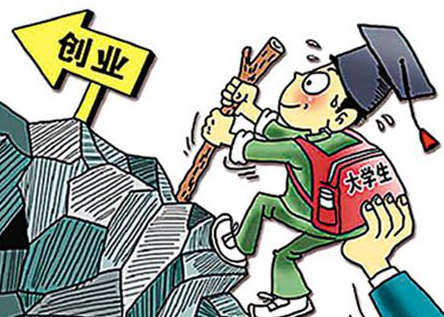(单词翻译:单击)
A report on entrepreneurship among Chinese college students published by Renmin University of China revealed an inverse proportion between the level of students' academic degrees and their intentions to start their own businesses.
中国人民大学近日发布的我国大学生创业报告显示,学生学位与其创业意愿成反比。
According to the report, students from prestigious universities were less willing to start businesses, likely because of high opportunity cost.
报告称,名校学生的创业意愿较低,或许因为创业机会成本高。
More than 430,000 students from 1,767 universities in 31 provinces, municipalities and autonomous regions across China were surveyed. Of the respondents, 89.2% had considered starting a business, with 18.2% reporting firm intentions to do so.
全国31个省(区、市)1767所高校43万多名学生接受了调查。89.2%的受访者曾考虑过创业,18.2%的受访者称有强烈的创业意向。
More than 70% said self-realization was the biggest motivation to start a business.
7成以上受访者表示,实现自我价值是创业的最大动机。

Common industries for college startups include catering, agriculture, IT, transportation, education and culture. 13.8% of the entrepreneurs were interested in hospitality and catering, while 13.7% chose agriculture, the report said.
大学生创业的常见领域包括餐饮、农业、信息技术、运输、教育、文化。报告称,13.8%的创业者对住宿、餐饮业感兴趣,13.7%的创业者选择农业。
Ninety percent of the students believe their universities' guidance on entrepreneurship would help their future businesses. In addition, they professed appreciation for policies intended to encourage entrepreneurship.
90%的学生认为他们大学在创业方面的指导将有助于他们将来的事业。此外,他们还对鼓励创业的政策表示赞赏。
The report found that students majoring in art, agriculture and engineering were more willing to start businesses, while those majoring in history and science showed relatively low interest.
报告发现,艺术学、农学、工学专业的学生创业意愿最高,而历史学和理科专业的学生创业兴趣相对较低。
A lack of capital and experience is the biggest obstacle for college entrepreneurs, the report suggested, stating that 40 percent of such young entrepreneurs rely on external capital such as loans from banks, investment organizations, schools and the government.
报告指出,缺少资金和经验是大学生创业者们面临的最大障碍,40%的年轻创业者们依赖于诸如来自银行、投资机构、学校和政府等机构贷款的外部资金。


